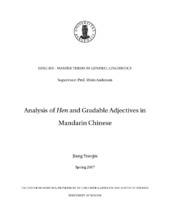| dc.description.abstract | In Mandarin Chinese, gradable adjectives map the properties of the arguments into abstract representations. The intensifiers can modify gradable adjectives. Hen, an intensifier, is widely used in Mandarin Chinese. There are plenty of the gradable adjectives, but it is difficult to build a distinctive standard. Mandarin Chinese lacks the standard methods to evaluate whether an adjective is a gradable adjective. This thesis introduces two tests for the distinctive standard, including the hen test and the comparison test. The hen test is to test whether hen can modify an adjective. The comparison test is to test whether an adjective can be used in a comparative form. If one adjective has at least one hit in one test, it means that the evaluated adjective can pass this test. This thesis argues that all gradable adjectives have to pass the two tests. The center for Chinese linguistics corpus CCL (2016) is used to identify the gradable adjectives in Mandarin Chinese. If an adjective has at least one hit in the query result of each test, the corresponding adjective can be treated as a gradable adjective. The analysis of the gradable adjectives is controversial in Mandarin. The problem is data evidence of the gradable adjectives. Most of the previous analyses argued that the bare gradable adjectives as main predicates are not allowed. It is indeed allowed in Mandarin in the data collection, when the argument is known to the speaker and the listener. Those analyses had been built based on the ungrammatical bare gradable adjectives. In order to build an analysis for the gradable adjectives and hen, this thesis proposes two puzzles. The two puzzles include the puzzle of the bare gradable adjectives as main predicates and the reading puzzle. This thesis finds that the bare gradable adjectives as main predicates exist in Mandarin Chinese. They are allowed in Mandarin when the argument is specific. The reading puzzle is that the bare gradable adjectives are the positive reading or the comparative reading. The reading of the gradable adjectives is controversial, because the gradable adjectives can express the same meaning with the positive form or the explicit comparative form. The reading of the gradable adjectives is positive if there is no explicit comparison. The comparative reading should have an explicit comparative morphology or an explicit comparative context. This thesis proposes that gradable adjectives as main predicate require specific arguments in Mandarin Chinese. If the argument is unspecific, the bare gradable adjective as main predicate will be ungrammatical. A degree phrase, DegP, is used to build an analysis for the gradable adjectives and hen, where the bare gradable adjectives have covert degree morphology. Based on the specific argument and DegP, this thesis has built an analysis for hen and the gradable adjectives in Mandarin. This analysis manages to address the sentences with bare gradable adjectives and the sentences with hen and gradable adjectives. In combination with the movement, this analysis is able to address the sentence where de as a complement marker is preceded by a gradable adjective and is followed by hen. | en_US |
